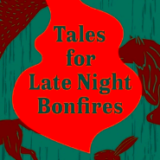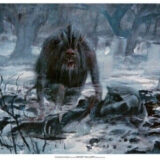It is to my ever increasing frustration that I continually see true literary talent dismissed as ‘too complex’ or ‘deep’ in favour of the mildly-talented easy-way-out authors who have become ‘popular’ in a day and age where mediocrity seems to be paramount.
Pratchett vs. Rowling
During the middle of the last decade – when I was knee deep in the world of Harry Potter, Harry Potter fan-fiction, and defending the ‘ships I believed to be pure – the BBC reported that Terry Pratchett had taken a swipe at J.K. Rowling. The opening paragraphs of the article read:
Writer Terry Pratchett has poked fun at Harry Potter author JK Rowling for saying she did not realise she was writing a fantasy novel.
He wrote to the Sunday Times:”I would have thought that the wizards, witches, trolls, unicorns, hidden worlds… would have given her a clue?”
This was all in response to an interview Rowling had done with Time magazine in which she said that she was “not a huge fan of fantasy” and was trying to “subvert” the genre. Pratchett’s words were, unsurprisingly, given little context and the story evolved into a slugging match that didn’t exist. Ever! Pratchett wrote a clarification of his remarks at the alt.fan.harry-potter newsgroup soon after the BBC article:
“… the BBC website put a nice little spin on thing on things with a headline suggesting I’m directing a tirade at J K Rowling, rather than expressing annoyance at the habits of journalists …”
The reality was that Pratchett was attempting to place Rowling in her place amongst the litany of fantasy authors who had already reinvented and subverted the genre. You see, the dull-witted author of the interview added that Rowling had “reinvented fantasy fiction”, a genre the interviewer believed had previously been stuck in “an idealised, romanticised, pseudofeudal world, where knights and ladies morris-dance to Greensleeves”.
Terry Pratchett, in his clarification, refocused where his argument had originally been directed:
“As soon as the Harry Potter boom began, journalists who hadn’t read a children’s book in years went “Wow, a wizards’school! Wow, broomstick lessons! ” and so on, and generally acted as though the common property of the genre was the entire invention of JKR … With such an easy wave we can dismiss, oh, Ursula leGuin, Diana Wynn Jones, Jane Yolen, Peter Dickinson Alan Garner…fill in the list.”
It was an interesting time to be a fan of the fantasy genre, but it seems that the lesson has never been learned. Terry Pratchett found himself in an awkward position in 2005. When he felt the need to come to the defence of fantasy authors, he was also coming to his own defence, and any words he penned in regards to names like Ursula leGuin, Diana Wynn Jones, etc, also encompassed him.
The problem, as I see it, came down to a competition between popularity versus quality, and it is a problem that has plagued the creative world for time immemorial.
The Problem
I sometimes wonder whether humanity should be allowed voting rights, in any arena. Take a look at the Goodreads list of ‘The Best Fantasy Books’ and you’ll begin to get an idea of what I mean. Number one is given over to The Hobbit, with positions 2, 3, 5, 6, 8, 9, and 11 filled out by the entire Harry Potter series (as a note, down at 16 is the entire Harry Potter Boxset). Squeezing their way into the top 10 are all three of J.R.R. Tolkien’s Lord of the Rings, and the full trilogy in at number 12.
What on Earth is driving this list? How did The Hobbit – a clever and witty book by the most important author to ever grace the genre of fantasy, for sure – reach number one? How did the amazingly imaginative but at times-poorly written Harry Potter series fill out the rest of the spots, allowing only a little room for The Lord of the Rings to pepper the remaining spots.
Let’s be clear, I like the Harry Potter series. I firmly believe that J.K. Rowling created a truly imaginative tale that did a lot for the genre as a whole. It has played a part in revitalising the genre and allowing it to once again rise to ascendancy over Sci-Fi. All of that said, however, it is impossible for me to contemplate the possibility she is a better writer than others.
For example, Orson Scott Card’s Ender’s Game came in at 13th, The Chronicles of Narnia by C.S. Lewis at 14th, and A Game of Thrones by George R. R. Martin all the way down at 19th, while mind-bogglingly Eragon and Brisingr take spots numbers 15 and 21 respectively.
Truly quality is simply the unwanted stepchild of literature, if somehow J.K. Rowling and Christopher Paolini are outplacing authors like Patrick Rothfuss (The Name of the Wind at 25) and Terry Pratchett (Guards! Guards!, the first Pratchett book in the list, at number 43).
In the Defence of Preference
Some will yell at me and decry that I simply “don’t like Harry Potter”. Nothing could be further from the truth. This is not an argument about what I like and don’t like. I’m allowed not to like certain authors and stories, but conversely I am not allowed to let those biases affect how I review and rate books based on quality. When I am reviewing a book or writing an opinion piece such as this, the quality of an author’s writing talent is what is important, not whether or not I like vampires and werewolves.
So when I am taking Terry Pratchett’s side in an argument such as this, I am not dismissing the popularity of a certain book or series or author, or proclaiming it has no redeeming features, but rather raising the question of why that author is popular in the first place.
This is especially interesting when you consider that writers like Rowling, Paolini, and everyone’s favourite Stephanie Myer, are quantifiably not as good as writers like Terry Pratchett and George R. R. Martin. They’re prose is weak, their characters two-dimensional, and their grasp of the genre lousy at best.
To be honest, I haven’t read much of Myer’s work, and Paolini finally managed to grow in his writing with the final book in his Inheritance Cycle, Inheritance. It was a real pleasure to finally see him grow as a writer, and stretch himself beyond the stereotypical stories and prose he had relied on for the first three books.
The Solution
There is none.
Conclusion
I’m really quite serious, actually. This article is, in reality, a giant waste of time, because I have no solution and, in fact, I realise that no solution will ever be forthcoming. On paper all we’d have to do is ensure that everyone was properly educated in the principles of creative writing and ensure bias was never allowed to influence someone’s opinion. Which is of course ridiculous.
What I want, however, is for those who are spending their time communicating to the general populace to take a few extra moments to understand what it is they’re writing about; to consider the possibility that just because you’ve never read a fantasy book you liked until you read Harry Potter that there is still wonderful writing out there.











Great article Joshua.
For me it is similar to the question of what is science fiction and what is fantasy. Or the question what kind of music do I like? I like what I like. I enjoy different literature for different reasons. Sometimes I need something that is action packed and doesn't require any deep thinking. Sometimes I want something more thoughtful.
The unfortunate truth of popularity is exposure. If no one reads a book, then they can't enjoy it. The exposure gained through film cannot be matched by any current medium. Naturally those books adapted to film will gain greater popularity. Even GRRM himself has benefited by an amazing surge in popularity thanks to HBO.
Right or wrong film adapted books will always be the most popular. The good part for all of us obscure writers is that it inspires people to explore other works that they might not have ever discovered.
In my opinion, reading is done for information and for entertainment. Everyone is entertained in different ways. There is a reason the Oscar winners never make as much money as the special effects films, because not as many people are entertained by them.
Studios know going into each film if their goal is big box office or critical acclaim. It seems as if the two are mutually exclusive. Perhaps we can draw a parallel to literature as well.
Something to ponder.
RKT
I think you raise another issue as well, Joshua … that of annoying journalists who may have intentionally distorted Pratchett's comments merely to stir-the-pot and increase their readership.
As for quality, I make some allowances. I try to distinguish between a good storyteller and a good writer. And enjoy the works for what good can be found within a work.
I think of a good writer as someone who can sweep me along with their prose.
A good storyteller, however, can get away with inferior writing by having superior ideas. You know, the plot concept is strong and the structure is clear.
Good writers, on the other hand, sometimes get swept up with the immediacy of their prose and sometimes go short on structure.
I'm glad you mentioned Patrick Rothfuss and The Name of the Wind. I think he's terrific at prose and, so far in that series, his storytelling is above average. I don't feel like I have to choose between good writing and a good story.
As for a solution … I think your article is part of it. Bringing these issues up is part of the solution. Creating dialogue and discourse on our favorite subjects is part of the solution. If we express our satifaction and our pleasure with good works and good writers, our writers, our editors, and our critics will have a better idea what fans want. And I think everyone can win with that approach … as long as annoying people aren't spoiling for a fight just to improve ratings and readership.
The popularity of the fantasy novels appear to be directly proportional to their ability to create a film franchise. As such, the goodreads list isn't really a reflection of writing, per se, but of the adaptability of the material to a film treatment.